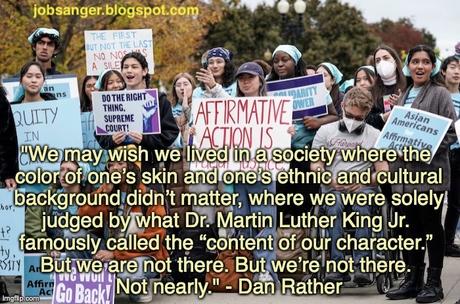
The following is a statement on the Court's misguided affirmative rights decision by Dan Rather and Elliot Kirschner:
The injustices of race in America infuse so many aspects of society. They are the legacy of our often cruel and tortured history. And they still reverberate today.
We may wish we lived in a society where the color of one’s skin and one’s ethnic and cultural background didn’t matter, where we were solely judged by what Dr. Martin Luther King Jr. famously called the “content of our character.” But we are not there. We’ve improved, we’ve learned, we’ve made progress. But we’re not there. Not nearly.
The Supreme Court’s ruling today largely banning affirmative action for race in college admissions is based on a fundamental distortion of American reality. The court’s majority stipulates that the consideration of race as one of many factors in whom a college admits poses a grave constitutional injustice. To be sure, the tool is an imperfect remedy for centuries of systemic racial hatred, exclusion, and violence. But to measure its worth, we can’t ignore the history that necessitated it. Or the reality of what persists.
In America, race has long been a factor, and often the biggest one, for a host of societal considerations — who was allowed freedom, who was viewed equally under the law, whose civil and human rights were respected, where people could live, and who could vote. In all of these cases, Black Americans, Native Americans, and other groups to some extent were the ones who were excluded. That should be the rightful historical framework for any court action.
“Gulf-sized race-based gaps exist with respect to the health, wealth, and well-being of American citizens. They were created in the distant past, but have indisputably been passed down to the present day through the generations,” Justice Ketanji Brown Jackson wrote in her compelling (and demoralizing) dissent. “No one benefits from ignorance. Although formal race-linked legal barriers are gone, race still matters to the lived experiences of all Americans in innumerable ways, and today’s ruling makes things worse, not better.”
In the wake of the decision, many are sharing their personal experiences and examining the legal and social context for affirmative action. Sadly, these powerful real-world considerations were ignored by the court. What we are left with are passionate, erudite, and harrowing testimonials of loss.
It is not surprising that this court threw aside its own precedent along with an honest assessment of the realities of American society in 2023. After all, the decision’s author, Chief Justice John Roberts, also felt that most of the protections of the Voting Rights Act were no longer necessary. We can see how that worked out.
But supporters of affirmative action also have to contend with the fact that the practice, whatever its merits, was unpopular with a majority of the American public. Part of that is due to the forces of privilege and intolerance that made it necessary in the first place. But affirmative action’s critics were also able to effectively appeal to notions of fairness, even if their arguments conveniently omitted the full context of both history and the present.
Ironically, reclaiming the banner of fairness will fall mostly on the populations who have suffered its absence.
Where does this leave us? Some court watchers believe there will be more chaos as schools scramble to conform to a new reality that remains legally murky. But there is also a challenge for policymakers who care about promoting opportunity for all Americans.
The Supreme Court has ruled. So what now? Who has workable ideas on what should be next?
Perhaps this moment can usher in a new era of commitment and innovation. Let us hope that we will now focus on creating new pathways for those needing to overcome the odds to reach the full measure of their potential. Doing so necessitates a much earlier start than college admissions. It means investment in health and welfare, a renewed commitment to public education, and opportunities for those of every race confronting the hurdles of generational poverty.
It means a commitment to diversity that reaches out to those most in need of help and includes them in the decisions of how we allocate American abundance. It means voting reforms. And a commitment to broad democratic principles. It means action, energy, and resilience for those who have already borne unequal burdens. And it means dedicated allies.
Affirmative action was a helpful but modest Band-Aid on the deep and persistent wounds of American racism. It is now largely gone. The robustness of our nation requires that a more substantial and sustainable set of remedies take its place.

